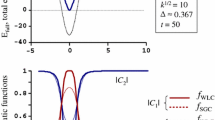Abstract
It has been shown in the framework of the theory of nonadiabatic transitions that consideration of the exponential dependence of the electronic matrix element of a transition on the distance between the reactants leads to a compensation effect. An expression for the isokinetic temperature in terms of the activation energy and the characteristic vibrational frequency has been obtained for reactions taking place in the normal region in nonpolar media. The conditions for the observation of the compensation effect and the conditions determining the sign of the isokinetic potential have been discussed.
Similar content being viewed by others
Literature cited
R. R. Dogonadze and A. M. Kuznetsov, “Kinetics of heterogeneous chemical reactions in solutions”, Itogi Nauki Tekh., Ser. Kinet. Katal., 5, (1978), VINITI, Moscow.
A. A. Ovchinnikov and M. Ya. Ovchinnikova, “Theory of elementary electron-transfer reactions in a polar liquid,” Zh. Éksp. Teor. Fiz., 56, No. 4, 1278–1289 (1969).
V. A. Kondrat'ev and E. E. Nikitin, Kinetics and Mechanism of Gas-Phase Reactions [in Russian], Nauka, Moscow (1975).
V.A. Pal'm, Principles of the Quantitative Theory of Organic Reactions [in Russian], Khimiya, Leningrad (1977).
V. V. Voevodskii, Physics and Chemistry of Elementary Chemical Processes [in Russian], Nauka, Moscow (1969).
A. I. Burshtein, B. I. Peshchevitskii, and S. P. Sham, “Compensation effect and true activation energies of some chemical processes,” Dokl. Akad. Nauk SSSR, 153, No. 4, 852–854 (1963).
V. I. Gol'danskii, “Role of the tunneling effect in the kinetics of chemical reactions at low temperatures,” ibid., 124, No. 6, 1261–1264 (1959).
S. Z. Koginskii and Yu. L. Khait, “Origin of the compensation effect in chemical kinetics,” ibid., 130, No. 2, 366–369 (1960).
J. Ulstrup and J. Jortner, “The effect of intramolecular quantum modes on free energy reactions chips for electron-transfer reactions,” J. Chem. Phys., 63, No. 10, 4358–4368 (1975).
S. Fischer and G. Venzl, “On the dynamics of exothermic triatomic exchange reactions,” ibid., 67, No. 4, 1335–1345 (1977).
N. Kh. Bikbaev, A. I. Ivanov, G. S. Lomakin, and O. A. Ponomarev, “Theory of radiation-less processes in a ‘non-Condon’ approximation,” Zh. Éksp. Teor. Fiz., 74, No. 6, 2154–2166 (1978).
É. S. Medvedev and V. I. Osherov, Theory of Radiationless Transitions in Polyatomic Molecules [in Russian], Nauka, Moscow (1983).
Author information
Authors and Affiliations
Additional information
Translated from Teoreticheskaya i Éksperimental'naya Khimiya, Vol. 22, No. 2, pp. 223–226, March–April, 1986.
Rights and permissions
About this article
Cite this article
Ivanov, A.I., Lomakin, G.S. & Ponomarev, O.A. Compensation effect in the theory of nonadiabatic reactions. Theor Exp Chem 22, 208–211 (1986). https://doi.org/10.1007/BF00519196
Received:
Issue Date:
DOI: https://doi.org/10.1007/BF00519196




